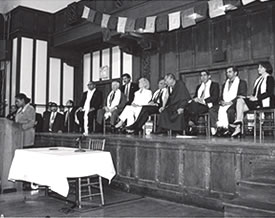
In July 2012, an eleventh hour phone call with instructions from the White House abruptly stalled passage of an all-but-complete 193-nation Arms Trade Treaty at the United Nations. Susan Waltz, professor of public policy, believes that was a mistake.
As chair of Amnesty International, Waltz helped launch the international movement for an Arms Trade Treaty. She sat on the first steering committee, helping to map the strategy for moving from a "code of conduct" to a full-fledged international treaty, and she continues to keep her hand in the game. When Amnesty International is looking for a United Nations representative—to deliver testimony, participate in a panel for diplomats, or introduce a screening of Lord of War—Susan Waltz is one of the first they call.
So when Waltz says the Arms Trade Treaty is something worth fighting for, we couldn't have it from a more knowledgeable source. Every minute of every day, someone dies as a result of irresponsible arms transfers, a tragedy the Arms Trade Treaty seeks to address through regulation.
 |
|
Susan Waltz (far right) sits on stage with His Holiness the Dalai Lama and seven other Nobel Prize winners, including Elie Wiesel and Óscar Arias, before signing the 1997 International Code of Conduct on Arms Transfers. |
"When the Soviet Union collapsed, enterprising new businessmen sold mountains of Soviet AK-47s to African nations in exchange for gold and diamonds. Those weapons fueled massacres in Sierra Leone, Rwanda, Liberia, and Darfur," explains Waltz. But the problem isn't just in Africa, and the weapons aren't only from Russia and China. "In so many conflict zones where civilians are terrorized and rape has served as a war strategy, small arms have made it possible—small arms that aren't produced locally."
In a letter to the New York Times in August, Waltz criticized the White House for caving to the gun lobby by pulling support on the last day of a three-week negotiation. "In bowing to the gun lobby, the Obama administration passed up the opportunity to make the world a little more secure," wrote Waltz, who will continue to work for the treaty's passage.
Editor's note: At press time, the United Nations unanimously approved a resolution to reconvene Arms Trade Treaty negotiations in the spring.
Below is a formatted version of this article from State & Hill, the magazine of the Ford School. View the entire Fall 2012 State & Hill here.